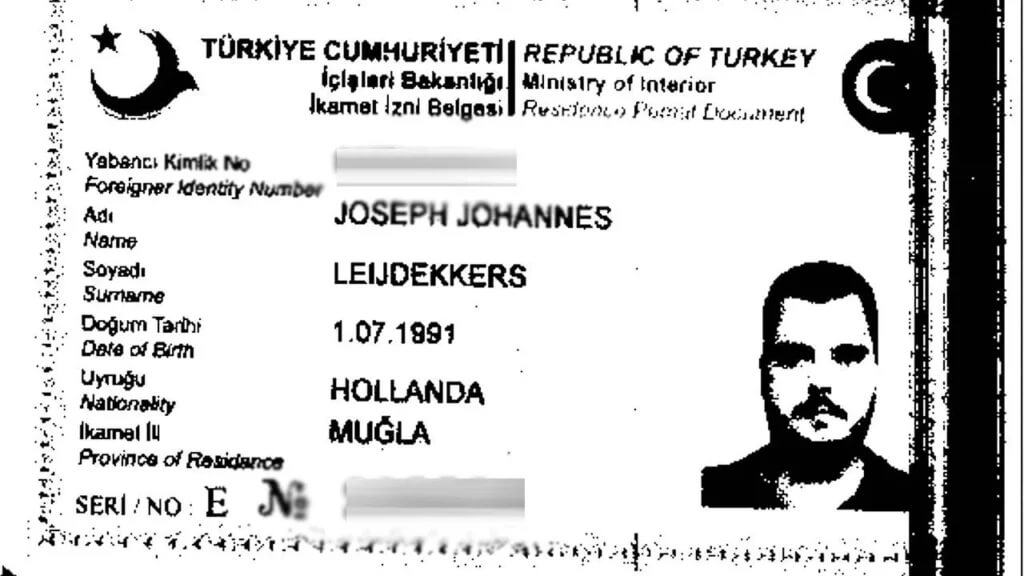International drug trafficker Joseph Johannes Leijdekkers obtained residence permits in Turkey using both his real name and the fake name “Daniel Ernst,” according to a report in the Birgün daily on Thursday.
Leijdekkers, also known as “Bolle Jos” or “Chubby Jos,” is believed to be the mastermind behind an expansive cocaine network stretching across Latin America, Europe, Turkey and Australia.
As the alleged kingpin of a large-scale operation conducted by Turkish law enforcement against an international cocaine smuggling ring in June 2023, which led to the detention of 23 suspects and the seizure of assets worth over 1 billion Turkish lira, Leijdekkers remains at large.
The report by journalist Timur Soykan said the notorious Dutch drug baron was granted two separate residence permits in Turkey, under two different names, which would normally be impossible due to the usual requirements for obtaining a permit, including intelligence checks, fingerprinting and biometric photographs printed on the identity card.
“So, who was involved in this scandal? Who stepped in for the Dutch drug lord and granted him two residence permits?” Soykan asked.
The journalist also reminded that all the suspects arrested in operations targeting Leijdekkers’ organization were released.
The operation targeting the drug ring led by Leijdekkers and Abdullah Alp Üstün, who was the organization’s key figure in Turkey, resulted in the arrest of 51 suspects, with prosecutors seeking prison sentences of up to 82 years for them.
Earlier in July the İstanbul 15th High Criminal Court released 15 defendants arrested pending trial. Although a higher court decided five days later to re-arrest seven of them, including Leijdekkers’ brother Wilhelmus Adrianus Leijdekkers, it was discovered that the suspects had fled.
Leijdekkers entered Turkey on July 4, 2020, with a German passport issued in the name of “Daniel Ernst” and left the country after staying for a while. On September 7, 2020, he again entered Turkey with a passport issued in his real name.
On November 23, 2020 he obtained citizenship by investment. Leijdekkers, who lived a luxurious life in İstanbul and the coastal town of Bodrum at the time, received a residence permit in his real name on December 3, 2020.
According to Soykan, evidence found in a villa in Bodrum within the scope of the investigation into Leijdekkers’ organization showed that he also obtained a residence permit in Turkey using his fake identity, “Daniel Ernst.”
The Turkish government has long been accused of making Turkey a safe haven for international criminals by granting them citizenship.
The allegations have been denied recently by İbrahim Taşyapan, director general of Civil Registration and Citizenship Affairs under the Interior Ministry, who said his directorate is closely monitoring the citizenship application process and has increased security checks to include verification from INTERPOL for security clearances both during the application phase and shortly before the application is finalized.
The United Nations Office on Drugs and Crime’s (UNODC) “Global Report on Cocaine 2023” revealed Turkey’s rising role as a transit country for cocaine. In 2021 Turkish authorities seized a record 2.8 tons of cocaine, reflecting a sevenfold increase in drug seizures since 2014. The report notes that some cocaine reaches Turkey via West Africa, while other shipments come directly from Latin America. The outbound flow from Turkey primarily moves westward through the Black Sea and the Balkans.
The crackdown on drug trafficking networks in Turkey has gained momentum following a cabinet reshuffle in President Recep Tayyip Erdoğan’s administration in June of last year. The new leadership appears to be taking a harder stance against drug trafficking, which was allegedly facilitated by authorities under the previous interior minister, Süleyman Soylu.
During Soylu’s time in office, Turkey faced allegations of involvement in international drug trafficking, primarily driven by Turkish mob boss Sedat Peker. In a series of dramatic videos in 2021, Peker accused Soylu and other high-ranking officials of protecting and facilitating cocaine trafficking networks.
Observers speculate that the recent shift in Turkey’s stance on drugs may be part of a broader effort to restore the rule of law and reassure international investors amid Turkey’s economic challenges.
